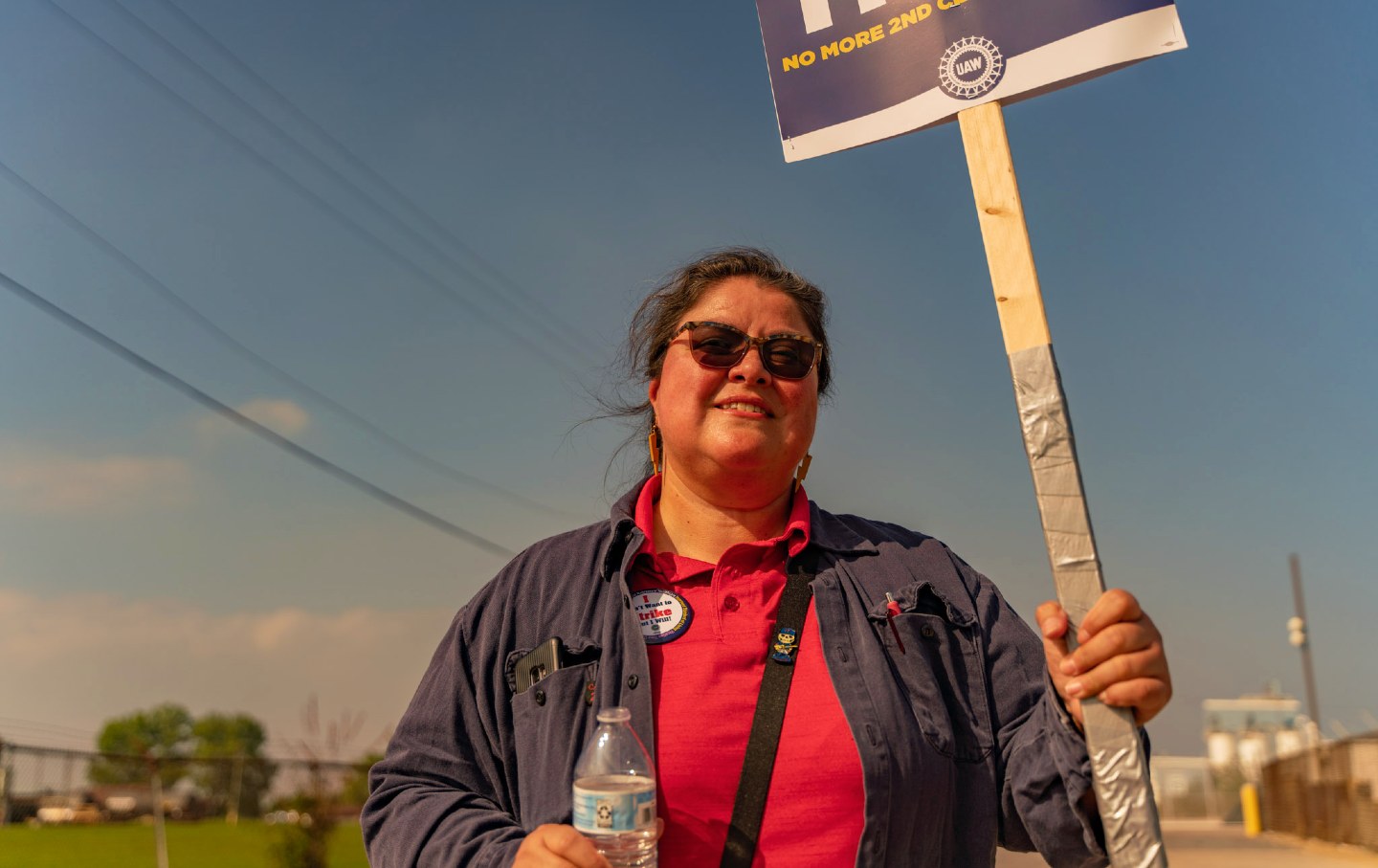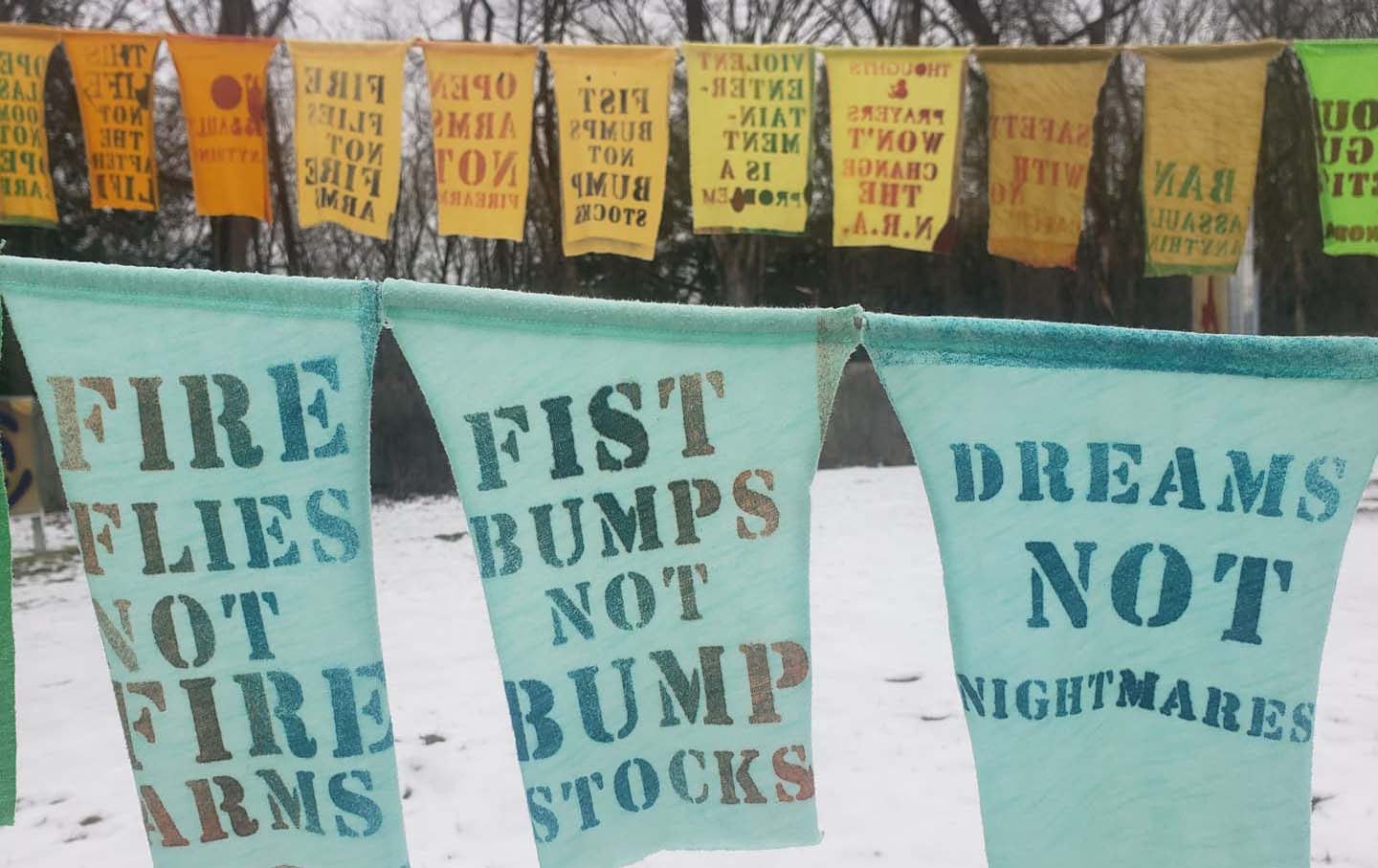Activism
/
February 28, 2024
More than half of organized labor in the US is part of a union that has called for a permanent cease-fire in Gaza. One worker explains why.

Marcie Pedraza pickets near an entrance to Ford’s Chicago Assembly plant during UAW’s stand-up strike on September 29, 2023.
(Oscar Sanchez)
When asked why workers in the United States care about people in Gaza, Marcie Pedraza immediately brought up the animating principle of labor organizing: solidarity. The 48-year-old autoworker told me, “Workers are always being attacked by companies or being exploited,” and the only antidote is banding together. This, she said, was reinforced during the United Auto Workers’ (UAW) strike, when she and her colleagues at Ford’s Chicago Assembly Plant joined thousands of workers who walked out in rolling, surprise strikes against the Big Three automakers. Why, she asked, wouldn’t this same concept apply to people being targeted in a lethal military campaign in another part of the world, who are suffering unimaginable levels of persecution and loss?
“Whenever someone is being oppressed, we should stand with them.”
Workers like Pedraza are, increasingly, the face of a US labor movement that is publicly disagreeing with President Joe Biden’s unwavering political support and arming of Israel’s military operations against the coastal enclave of 2 million. Four months in, the Palestinian death toll in Gaza is now over 29,000, including more than 12,000 children, according to the Gaza Health Ministry. And Israel’s siege has caused famine and medical collapse and displaced more than 80 percent of Gaza’s population. Israel is killing Palestinians at a rate unparallelled in modern conflicts, and the International Court of Justice determined in January that it is “plausible” that Israel is committing acts of genocide.
Current Issue

The majority of unionized workers in the United States—at this point, at least 9 million—are now members of unions that have directly called for a permanent cease-fire in Gaza, and major national and international unions, like the UAW and the National Education Association, have joined the new National Labor Network for Ceasefire. Roughly 12.5 million workers, many of whom overlap with the 9 million, are in unions affiliated with the AFL-CIO, which has also called for a cease-fire. The longer Israel’s campaign grinds on, the more mainstream this demand grows.
The leadership of the US labor movement has frequently hewed close to the foreign policy positions of the US State Department, with notable exceptions and some consistent outliers (including, at times, within the UAW). So the divergence on Gaza is remarkable, with growing numbers arguing as union plumber Paul Stauffer did in In These Times: “The War on Gaza Is a Labor Issue.” And as labor historian Jeff Schuhrke recently noted in Jewish Currents, networks of workers organizing in solidarity with Gaza are pushing their unions to escalate their actions beyond cease-fire statements. They want unions to directly pressure lawmakers, cut economic ties to Israel, disrupt the flow of weapons and intelligence to Israel, and make any endorsement of Biden contingent on the president’s support for a permanent cease-fire.
Pedraza pushed for a cease-fire resolution in her UAW Local 551 relatively early, coming off of a difficult and high-profile strike. Yet, when we discussed this feat at a community center in Chicago’s north side, she came across as humble and unfazed. A mother to a 13-year-old daughter, she has shoulder-length brown hair with a smattering of pencil-thin streaks of gray, and wears glasses that fade from blue to green to beige. I was struck by her willingness to dive into any topic I brought up in a manner that was both friendly and forceful. It is easy to imagine her being disarming and convincing in conversations on the shop floor or in the union hall—and it seems that’s exactly what she had to do.
After the UAW international executive board called for a cease-fire on December 1, 2023, Pedraza said, “I was like, I’m going to see if we can do something at our local. If you put them all together, it can be a trickle effect. Eventually someone will have to listen to us.”
At a general membership meeting on January 21, she came prepared with a statement she had pieced together by combining themes from resolutions passed by other locals, and by referencing an October 16, 2023, call to action from Palestinian trade unions, which urges global unions to refuse to supply weapons to Israel and “pressure governments to stop all military trade with Israel,” alongside other demands. “Right before the union meeting,” she explained, “we had committee meetings. I table-hopped, went to the skilled-trades meeting, went to the organizing committee table, and said I’m going to make this resolution. They said, ‘Yeah, OK.’”
When it came time to present her proposal formally at the meeting, she was nervous, she said. “I started talking about how I want to put it in terms workers can relate to. Our tax dollars are paying for this genocide. The government says we have no money for public education, for fixing our roads, for infrastructure, for the unhoused, no money for universal healthcare. But we have billions to spend on military aid for Israel. That’s something people can relate to.” Her proposal got a second, followed by brief discussion and “a little hesitation,” she said. “One guy tried to table it until the next meeting.”
But the resolution passed overwhelmingly, and when she circulated it publicly a few days later, it was praised in some corners of the Palestine solidarity movement for its strength: The text referred to Israel’s campaign as a “genocide,” directly referenced Palestinian trade unionists, and called for refusal to build and transport weapons to Israel.
Labor’s calls for a cease-fire are in line with public opinion in the United States: Polling shows that a majority of Americans, and more than 70 percent of Democrats, want a cease-fire. Yet the voices of people like Pedraza are often excluded from public debate about the issue—or outright denied. In an article published on February 2 in New York magazine, the prominent liberal pundit Jonathan Chait criticized UAW members who opposed their union’s endorsement of Biden while the president was backing the onslaught against Gaza. Chait framed these union members’ concerns as a fringe position adopted by graduate students (roughly 25 percent of UAW members are academic workers). Chait took issue with the idea that the labor movement, at its most “visionary,” should consider foreign policy a union issue. “It may not be surprising,” he wrote, “that the graduate-student wing of the UAW has a more visionary understanding of its mission than do the people who work in car factories.” (Chait, it’s worth noting, has been a longtime critic of teachers’ unions and has had to disclose, on a number of occasions, that his wife works for a charter-school advocacy group.)
Pedraza said that, for the purposes of this article, she didn’t want to get into the issue of UAW’s Biden endorsement. But she did want to make two things clear: It is “condescending” to say autoworkers are incapable of visionary, complex thought that grapples with the global nature of workers’ struggles. “They just assume we’re all uninformed,” she said, “that we are not knowledgeable about world events and all we’re here to do is just clock in and clock out.” And she said it’s wrong to drive a wedge between graduate students and other sectors of the working class; graduate students are highly exploited wage earners and are no less legitimate than any other worker.
Popular
“swipe left below to view more authors”Swipe →
As a blue-collar autoworker, Pedraza had been doing visionary organizing long before her local’s cease-fire statement. She has been a UAW auto worker since 2013, and a worker at the Chicago Assembly Plant, in the far south of Chicago near the Indiana border, since 2016. Trained as an electrician, she currently does preventive maintenance planning for the paint department, which involves generating work orders to keep the equipment and plant in good condition. “If they find something wrong, like a leaky pump, I make the work ticket and make sure it gets to whoever it needs to,” she explained. (She wanted to make sure it’s clear that she does not give people work and is not a supervisor.) She likes her role because it allows her to spend weekends with her daughter, in contrast to the years she spent on call for any trouble on the assembly line, when she had to work 12-hour shifts, both days and nights.
She grew up in the working-class neighborhood of South Chicago, where her grandparents came from Mexico to work in the railroads and the steel mills. Her dad, who had also worked in nearby steel mills, died when she was 9, leaving her mom to take care of five kids, a flock that would eventually expand to six, while working as an administrative assistant at the American Bar Association. Her family wasn’t particularly political growing up, she recalled, “but I saw Chicano Power buttons in my house, and I remember going to events with Harold Washington,” a progressive Chicago mayor in the 1980s.
Her high school ecology club got her interested in activism, but her first foray into organizing happened at University of Southern California, which she attended for two years, where she threw herself into a grape boycott campaign in solidarity with the United Farm Workers. She moved back to Chicago, and got jobs as a union electrician, and in construction, before becoming an autoworker, work that went hand-in-hand with union activism. “My daughter has been to protests with me since she’s been a baby,” she said. “Her first big demo was the Chicago Teachers Union strike in 2012. I remember marching with other friends pushing strollers.”
Pedraza is active in campaigns against environmental racism as the board president of the Southeast Environmental Task Force, serves on the Local School Council, and is part of Unite All Workers for Democracy, the grassroots UAW rank-and-file reform movement that got Shawn Fain elected to the presidency as a reform challenger in March 2023. The only elected position she has ever served in her union was on the election committee; currently, she serves on several other committees—women’s skilled trades and organizing. She is also involved in UAW Labor for Palestine, which has a large and active group chat that she has a hard time keeping up with. Asked about her political affiliations, Pedraza said she is a “leftist.” Her life’s work and her penchant for weaving together complex political arguments for international solidarity is a refutation of Chait’s claim that visionary thinking does not happen on the factory floor.
Pedraza said she is eager for the labor movement to take robust action to make the growing cease-fire calls a reality, as the situation for people in Gaza grows increasingly desperate. Reports are emerging of Gaza residents forced to resort to eating animal feed and of disease spreading as Israel turns hospitals into attack zones. Civilians face escalating lethal attacks, reporting that there is nowhere safe to flee. Despite rising global calls for a cease-fire, including from major humanitarian organizations, Biden’s material support for Israel has not faltered. In the months following the October 7, 2023, Hamas-led attack that killed around 1,200 people, mostly Israelis, Biden has been pressing Congress to send $14 billion in military aid to Israel, and has repeatedly circumvented Congress to send more weapons. On February 20, the Biden administration for the third time vetoed a draft resolution for an immediate humanitarian cease-fire at the United Nations Security Council, instead calling for a temporary cease-fire conditioned on the release of 134 Israeli and foreign-worker hostages who remain in Gaza.
Pedraza does not wish to equate the suffering of Palestinians in Gaza with the hardships US workers face. “Our schools don’t have working heat or air conditioners, but at least my kid has a school structure,” she said. “These kids in Gaza don’t even have a house.” But she does think that workers’ experiences of being exploited and mistreated can open a door to increased global solidarity. This doesn’t always come easily, she said. Just like anyone else, workers “can be only concerned about what’s going on in their own families or their own communities.”
But she noted, “People at work are always trying to survive. Things cost so much more. Everyone has side hustles. People are always trying to sell something at work. This is one of the reasons our strike was so successful.”
“There’s no money to do anything about the problems we have here,” she added, “but there is always money for war.”
More from The Nation

Gun violence in the USA keeps increasing at an alarming rate. An outdoor installation was created with crowd-sourced T-shirts and original messages.
OppArt
/
Martha Lewis

Felecia Phillips Ollie DD (h.c.) is the inspiring leader and founder of The Equality Network LLC (TEN). With a background in coaching, travel, and a career in news, Felecia brings a unique perspective to promoting diversity and inclusion. Holding a Bachelor’s Degree in English/Communications, she is passionate about creating a more inclusive future. From graduating from Mississippi Valley State University to leading initiatives like the Washington State Department of Ecology’s Equal Employment Opportunity Program, Felecia is dedicated to making a positive impact. Join her journey on our blog as she shares insights and leads the charge for equity through The Equality Network.




